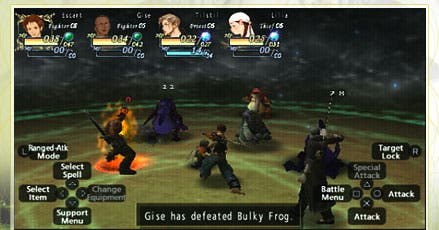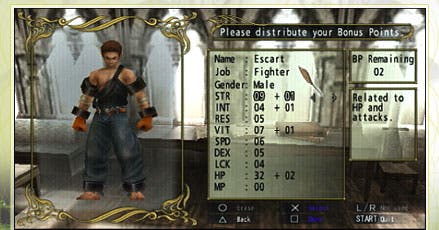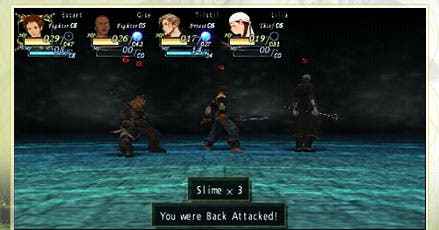Valhalla Knights
But Valhalla's where Vikings went, not knights.
Build your own RPG! Just select one answer to each question below, and you'll have a complete design brief for your generic fantasy hack'n'slash roleplaying game, bound to be accepted by any number of publishers who long ago decided that storytelling, believable characters and variety are just irritating baggage nowadays.
1. Character origin:
- a) Amnesiac with a mysterious past!
- b) Lowly peasant with a destiny!
- c) Dethroned royalty!
2. Combat style:
- a) Turn-based arena, ton o'menus
- b) Hammer a single button over and over
- c) Button combinations only a man with eight hands could master
3. Art style:
- a) Beards, robes, sternness
- b) Spiky hair, big eyes, incredibly short skirts
- c) A bit steampunky - put some giant cogs in or something

4. Progression
- a) Go where you're damn well told to
- b) Shut up and watch this twenty-minute cutscene
- c) One long dungeon crawl
5. Story approach
- a) Shut up and hit these goblins
- b) Shut up and watch this twenty-minute custscene
- c) Read the entire manual and vast amount of supporting fiction if you want to even begin to understand what's going on
6. Dialogue style
- a) Verily, forsooth, well met traveller
- b) Shut up and hit these goblins
- c) "..."
By way of example, let's reverse-engineer forgettable PSP roleplayer Valhalla Knights and see which options it chose.
Question one:
The lead character starts the game with no memory of who they are - this is, of course, a very clever decision because one in two RPGs use the exact same plot device, so it must be good. Anyone ever met an actual amnesiac? Didn't think so. Seems to me that there's no reason to think that fantastical types should be somehow more prone to memory loss than us mere mortals, and yet so many of them seem to suffer it. Perhaps it's a side-effect of wearing all that magic armour.
Question two:
It's a experimental but clumsy hybrid of traditional Final Fantasy arena fights and real-time button mashing. Interesting, but given the realtiminess, the archaic arena system (which even FF has now moved on from) feels even more crushingly artificial than usual. Monsters respawn endlessly and rapidly, so every journey is peppered by constant interruption or only sometimes successful running away. Apart from the actual act of hitting something, it comes across as parody of the traditional Final Fantasy mechanic - everything that used to grate about that is miserably exaggerated here. What's a lot more well-considered is the party system - like Dungeon Siege or Final Fantasy XII, you can program your NPC allies' behaviour in battle. You always have direct control of a party member of your choosing, but the rest should be stabbing, shooting, magicking or healing all by themselves. It doesn't feel as hands-off as it sounds, as usually you'll be controlling your best melee guy, so it's still very much your fight.

Question three:
Instantly familiar as a fantasy J-RPG, but not one that tries to paint a unique world. It looks exactly like the kind of depressingly samey art that a million forum kids have in their sigs. It's not remotely concerned with having its own visual identity - except for one intriguing design decision. Almost everyone in the game except your party is quite horrendously ugly. Buck-teeth, disfigurements, big red faces, hunched backs; no wonder the NPCs are so frosty to your group of beautiful ones and charge a ludicrous amount of money for everyday items. It's a fascinating approach and, despite the game's litany of other errors, makes it very clear that you really are the hero here, not just some random mook with a longsword.
Question four:
Vaguely pretends you can adventure as you choose, but really it's just about getting slightly lost in a linked series of mazes with only one exit. Just as well really, as the quest descriptions are laughably unhelpful. An early one asked that I escort an unidentified and unseen chap through a dangerous area. After miserably checking every last corner of town for the bugger, I eventually discovered he's apparently been with me since I accepted the quest, but this is never mentioned. He only actually appears at the moment of completion, which happened accidentally as a result of frustrated blundering around. Another had me searching for a Hobbit girl an also unseen human boy was in love with; after fifteen minutes of aimless wandering, I found her standing motionless in a cave with her face pressed up against a giant's bottom. It's not that she'd been kidnapped (no reason was given as to why an unarmed midget had wandered into a monster-filled death-trap) - that's just where her character model had been carelessly dumped. I told her about the boy's feelings; she said she didn't feel the same way, and then I got some money. Perhaps I was supposed to feel somehow saddened by this tragic yarn, but as the only thing I knew about these two people is that one apparently likes to stand in caves and the other fancies girls from other species, I can't say I really connected to them. Some quests are slightly less asinine, but the courier formula is unwavering.

Question five
A horrid mishmash of Final Fantasy's self-important epic narrative and an elaborate world you're somehow already supposed to know about. The game itself does almost nothing to set the scene - you need to find out where you are and why you should care from elsewhere. If you don't, there is only confusion. Not that it matters- the only reason to care even once better-informed is craving more loot and higher levels.
Question six
Most of the game's dialogue is endlessly repeated shopkeeper fare; the rest is laughably unhelpful exposition from a spectral companion. There's a hellish amount of "...", even by J-RPG standards, and many sentences don't quite make sense - it's either a poorly written game, a crap translation to English or, probably, both.

